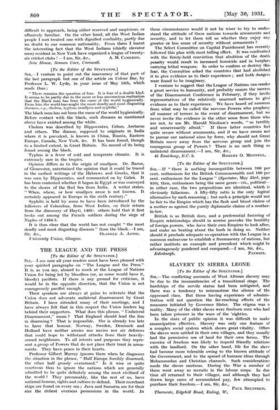THE LEAGUE AND THE PRESS [To the Editor of the
SPECTATOR.]
Sta,—I am sure all your readers must have been pleased with your spirited paragraphs on " The League and the Press." It is, as you say, absurd to mock at the League of Nations Union for being led by bloodless (or, as some would have it, bloody) pacifists. If there is any ground for criticism, it would be in the opposite direction, that the Union is not courageously pacifist enough.
Their speakers are always at pains to reiterate that the Union does not advocate unilateral disarmament by Great Britain. I have attended many of their meetings, and I have always felt that in this respect the Union leaders lag behind their supporters. What does this phrase, " Unilateral Disarmament," mean ? That England should lead the line in disarming ? That is impossible. She is already too late to have that honour. Norway, Sweden, Denmark and Holland have neither armies nor navies nor air defences that could hope to withstand attacks from their heavily- armed neighbours. To all intents and purposes they repre- sent a group of Powers that do not place their trust in arma- ments. They have peace in their hearts.
Professor Gilbert Murray ignores them when he diagnoses the situation in the phrase, " Half Europe forcibly disarmed, the other half grossly overarmed." Is it wise or quite courteous thus to ignore the nations which are generally admitted to be quite definitely among the most civilized of the world ? They presumably, like the rest of us, have national honour, rights and culture to defend. Their merchant ships are found on every sea ; Java and Sumatra are for their size the richest overseas possessions in the world. In these circumstances would it not be wiser to try to under- stand the attitude of these nations towards armaments and security, and to let them tell us whether they enjoy any greater or less sense of security without armaments ?
The Select Committee on Capital Punishment has recently followed this plan with most telling effect. It was confronted with the firmly-held conviction that abolition of the death penalty would result in increased homicide and in burglars carrying lethal weapons. In order to confirm or destroy this fear, the Committee asked the countries that had abolished it to give evidence as to their experience ; and both dangers were found to be imaginary.. I venture to suggest that the League of Nations can render a great service to humanity, and probably ensure the success of the Disarmament Conference in February, if they invite representatives of the relatively unarmed nations to give evidence as to their experience. We have heard ad nauseant from what may be called the nervous Powers who prophesy all manner of terrors in the event of disarmament, but we never invite the evidence in the other sense from those who are not, to use Mr. Harold Nicolson's words, " so terribly and unnecessarily afraid." If these latter countries feel quite secure without armaments, and if we have sworn not to pursue our national aims by force, why should not Great Britain move away from the nervous group and join the courageous group of Powers ? There is no such thing as unilateral disarmament.—I am, Sir, &c.,






































 Previous page
Previous page